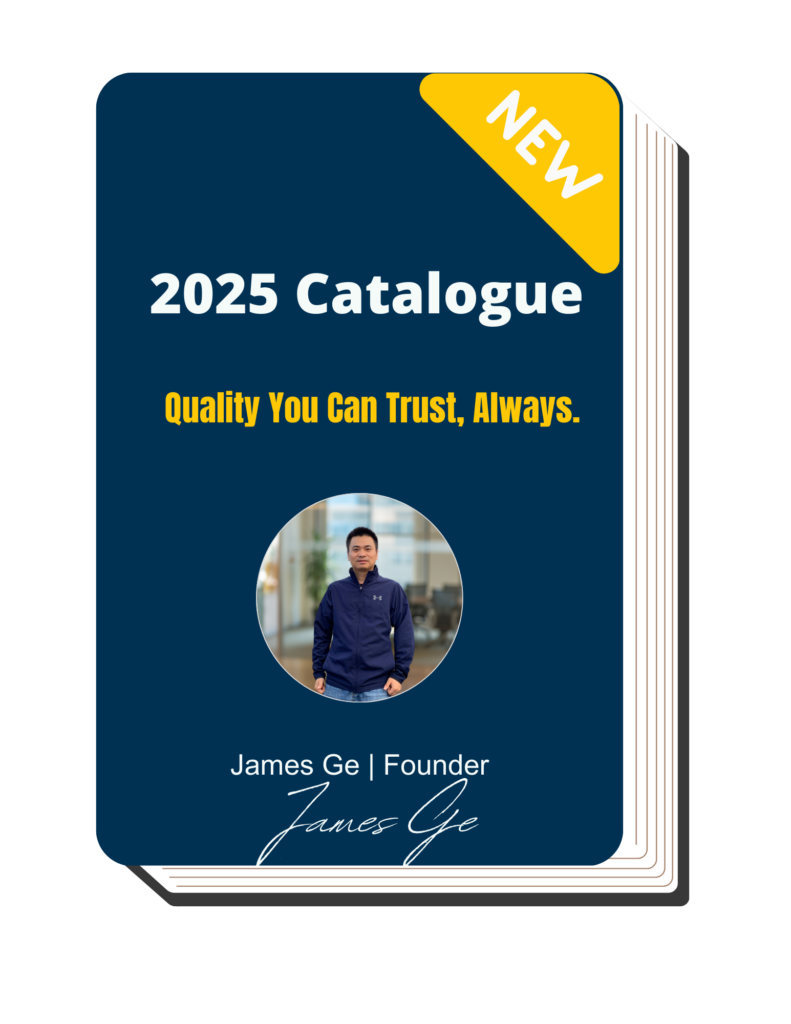A few years back, I spent nearly two weeks trying to track down a basic brake chamber for a dump truck.
It wasn’t some rare part. But every supplier gave me the same answers—out of stock, too expensive, or call back later.
Meanwhile, the truck sat idle. So did the crew.
That delay cost us thousands. And more importantly, it showed me how hard it is to find a supplier you can actually depend on.
Since then, I’ve worked closely with transport companies, workshop owners, and heavy-duty repair teams. I’ve seen which suppliers deliver—and which ones talk a good game but can’t follow through.
If you’ve struggled with poor service, delays, or low-quality parts, you’re not alone. This article shares 9 suppliers that have built real trust in the truck parts business.
By the end, you’ll have a solid tool to help you find the right supplier for your work.
So let’s get down to it!
Quick Comparison Chart
Let’s begin with a quick snapshot of each manufacturer—what they make, where they operate, and what sets them apart.
| Manufacturer | Year Established | Headquarters | Key Products | Production Style | Specialty Focus |
| Meritor | 1909 | Troy, Michigan, USA | Axles, brakes, drivetrain systems | Mostly in-house | Heavy-duty axle and brake systems |
| Dana Inc. | 1904 | Maumee, Ohio, USA | Driveshafts, axles, e-power systems | In-house + partners | Drivetrain + electrified components |
| Rhinotrail | 2009 | Quanpu Town Industrial Park, Liangshan County, Jining City, Shandong Province, China | Axles, suspensions, landing gear, brake systems, fifth wheel couplings, kingpins, tandem bogies, chassis parts | In-house production with robotic welding, CAD design, and large-scale volume | Heavy-duty trailer parts for transport, mining, agriculture, and logistics |
| ZF Group | 1915 | Friedrichshafen, Germany | Transmissions, axles, ADAS tech | In-house global plants | Smart driveline and vehicle safety |
| Allison Transmission | 1915 | Indianapolis, Indiana | Auto transmissions, e-axles, hybrids | In-house | Automatic shifting + defense applications |
| Bendix | 1924 | Avon, Ohio, USA | Air brakes, ABS, safety systems | In-house | Braking + control tech for commercial use |
| PACCAR | 1905 | Bellevue, Washington | Trucks, engines, aftermarket parts | Mostly in-house | Premium trucks (Kenworth, Peterbilt, DAF) |
| WABCO (ZF) | 1869 | Now part of ZF Group | Braking, suspension, fleet telematics | In-house | Safety automation + digital fleet tools |
| Volvo Trucks | 1928 | Gothenburg, Sweden | Electric, gas, and heavy-duty trucks | In-house global plants | Driver comfort + smart sustainability tech |
Now we’ll go through each company one by one to help you find the right fit for your needs.
1. Meritor
The first time I used a Meritor axle, I was helping a local fleet shop find a reliable replacement. Their tech didn’t hesitate—he said, “Go with Meritor.” That stuck with me.
Meritor was founded in 1909 and is based in Troy, Michigan. Today, they operate in 19 countries and have over 9,000 employees. Their parts are trusted in trucks, trailers, buses, and even military vehicles.
Product Range
- Axles: Front, rear, and specialty axles
- Braking Systems: Air disc and drum brakes
- Drivetrain Components: Driveshafts, transfer cases, and differentials
- Suspension Systems: Heavy-duty truck and trailer suspensions
- Aftermarket Support: Replacement parts and repair kits
Manufacturing Capabilities
- Production Volume: Large-scale capacity across multiple countries
- Types of Products: Axles, brakes, drivetrain parts, and suspensions
- Customization Options: Offers OEM, ODM, and private label solutions
- Production Style: Most parts are made in-house with strict quality control
- Technology Used: Advanced automation, robotics, and smart systems
Research & Development (R&D)
Meritor’s R&D is handled by their own team. They focus on safety, durability, and efficiency.
New parts go through strict testing before release. They also stay ahead by working on electric drivetrains, smart braking, and other new technologies. Some of their work has been patented.
Key Takeaways
Meritor is a strong player in truck parts. Their products are well-made and backed by years of industry knowledge. However, they focus mainly on drivetrain and braking systems—so if you’re looking for full engine parts or cabin components, you’ll need to look elsewhere.
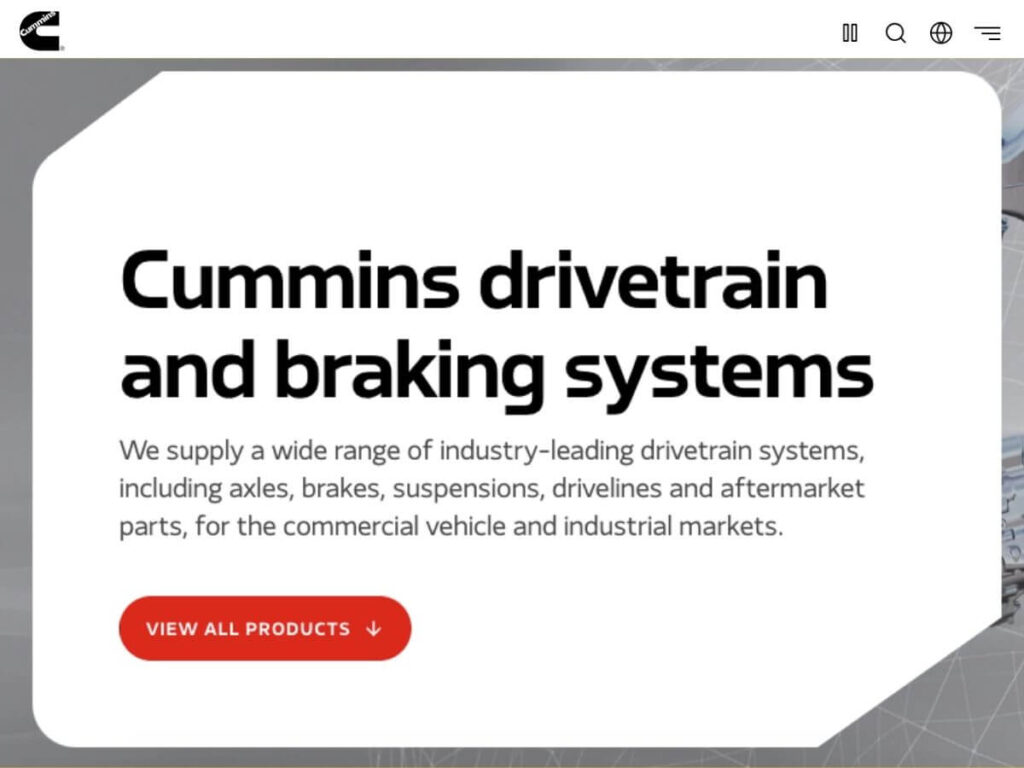
2. Dana Incorporated
Years ago, I worked with a client who had trucks hauling heavy loads through the Rockies. They kept burning through driveline parts—until they switched to Dana. Performance got smoother. Fewer breakdowns. That made me pay attention.
Founded in 1904, Dana is based in Maumee, Ohio. Today, they operate in over 30 countries with around 36,000 employees. They’re known globally for their drivetrain, sealing, and thermal-management systems—especially in heavy-duty and commercial vehicles.
Product Range
- Axles and Driveshafts: Core parts for moving power from the engine to the wheels
- Transmission Components: For both traditional and electric trucks
- Thermal and Sealing Products: To protect engines and improve performance
Manufacturing Capabilities
- Production Volume: High output across global facilities
- Types of Products: Focused on axles, driveshafts, and electrified systems
- Customization Options: Offers OEM, ODM, and private label manufacturing
- In-House vs. Outsourced: Most production is done in-house with close quality control
- Technology Used: Modern automation and smart robotics keep precision high
Research & Development (R&D)
Dana runs its own R&D operations and works with partners when needed. They focus on electric powertrains, lightweight materials, and fuel-saving technologies. Every new product goes through strict testing. Dana is also quick to respond to market changes—especially in electrification—and they hold many active patents in advanced vehicle systems.
Key Takeaways
Dana is a trusted name for drivetrain and power systems. Their scale and experience help fleets stay running smoothly. However, their focus leans toward complex systems—so if you’re just after basic parts, you might find simpler options elsewhere.
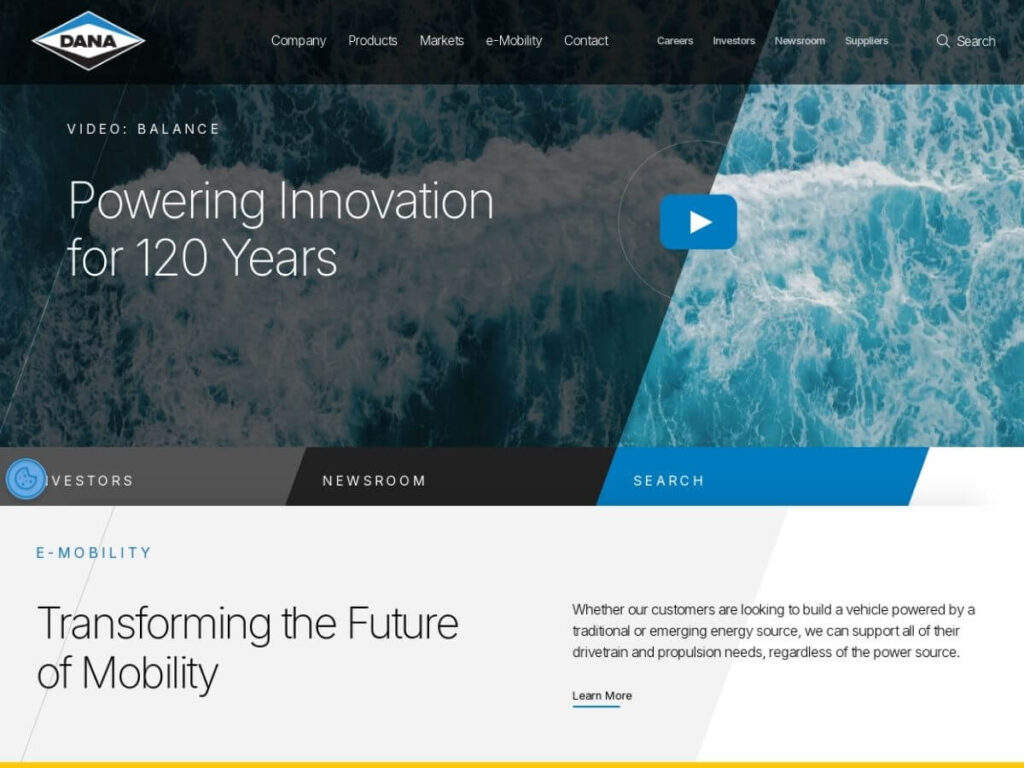
3. Rhinotrail
The first time I walked through a Rhinotrail production site, I could hear the machines shaping steel. Sparks flew from welding booths. Each trailer frame stood strong, built for the long haul.
Rhinotrail was founded in 2009 and is based in China. With over 200 employees, they serve clients worldwide. Their trailers are built for tough jobs—like mining, farming, and freight. You can feel the strength in every weld.
Product Range
- Skeletal Trailers: Used for carrying shipping containers
- Flatbed Trailers: Ideal for hauling bulky or heavy goods like machinery
- Axles: Heavy-duty types for different load capacities and road conditions
- Suspensions: Mechanical and air suspensions that reduce shock and wear
- Landing Gear: Helps support the trailer when it’s not attached to the truck
- Customized Solutions: Can be adjusted for length, load type, or axle setup
Manufacturing Capabilities
- Production Volume: Large-scale output with quick delivery timelines
- Product Types: Axles, suspensions, and full trailer units
- Customization: Offers OEM (original equipment manufacturer) and ODM (original design manufacturer) options
- Built In-House: Most components are made under one roof for quality control
- Technology: Uses automated cutting, precision welding, and computer-aided design (CAD)
Research & Development (R&D)
Rhinotrail invests in design and testing. Their R&D team works on axle strength, load balance, and fuel efficiency. They test trailer frames under harsh conditions to make sure they hold up. Some designs are based on real feedback from fleet operators and drivers.
Key Takeaways
Rhinotrail builds truck trailers and key trailer parts like axles and suspensions. Their products are made to handle rough roads, heavy loads, and long distances. If you’re looking for a supplier that understands the work your trailer goes through, we our worth checking out.
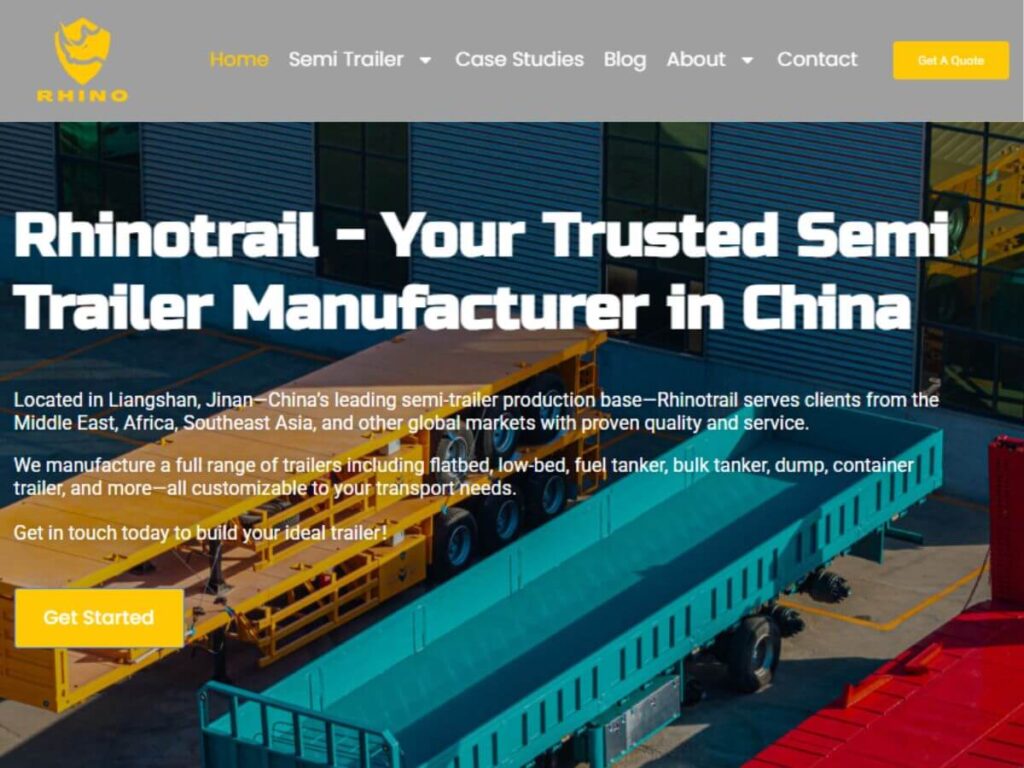
4. ZF Group
You know that smooth, quiet shift you get when the truck seems to glide from gear to gear? That’s often ZF. I spoke with a logistics team that switched to ZF transmissions across their fleet. They told me fuel use dropped, and their drivers felt less fatigue during long routes.
ZF Group started in 1915 in Friedrichshafen, Germany. Today, they operate in over 30 countries and focus on advanced driveline, steering, and safety systems for commercial trucks.
Product Range
- Transmissions: Automatic, manual, and hybrid
- Axles: Durable front and rear axle systems
- Steering: Electric and hydraulic steering units
- Braking: Electronically controlled brake systems
- ADAS: Advanced driver assistance like sensors, lane warnings, and cruise control
Manufacturing Capabilities
- Production Volume: Millions of parts per year
- Product Types: Driveline, chassis, and safety systems
- Customization Options: Offers OEM and ODM partnerships
- In-House vs. Outsourced: Most parts are made in ZF-owned plants
- Technology Used: High-precision automation and smart testing tools
Research & Development (R&D)
ZF develops its own systems through in-house R&D teams.
They focus on electric mobility, safety tech, and smarter brake controls. Their testing covers everything from temperature extremes to real-road durability.
Key Takeaways
ZF brings you advanced systems that improve fuel use, safety, and handling. However, if your maintenance crew prefers simpler, more mechanical setups, ZF’s high-tech features might take extra time to learn.
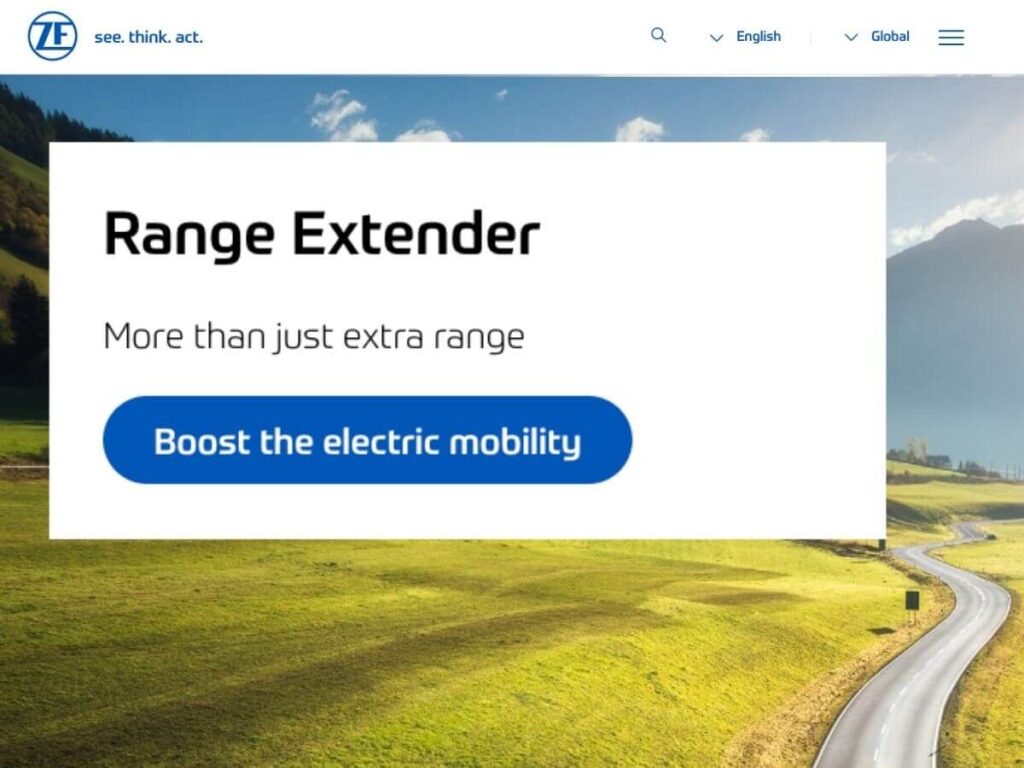
5. Allison Transmission
You ever talk to a driver after a 10-hour haul? I did—outside a jobsite in Phoenix. He leaned on the door of his refuse truck and said, “Allison’s automatic saved my back this week.” That’s when I realized Allison isn’t just making transmissions—they’re making the ride easier for people like you.
Founded in 1915, Allison is based in Indianapolis, Indiana. They supply propulsion systems used in commercial trucks, buses, defense vehicles, and more. With global reach across 150+ countries, they’ve become one of the top names in heavy-duty automatic transmissions.
Product Range
- Automatic Transmissions: For medium- and heavy-duty trucks
- Hybrid and Electric Systems: Fuel-saving and low-emission power
- eGen Power® Axles: Electric axles with serious torque
- Defense Transmissions: Tough builds for military-grade vehicles
Manufacturing Capabilities
- Production Volume: Millions of transmissions yearly
- Product Types: Automatic transmissions, electric axles, hybrid systems
- Customization Options: Offers OEM and ODM support
- In-House vs. Outsourced: Most parts are made in-house
- Technology Used: Robotics, precision assembly, and testing systems
Research & Development (R&D)
Allison runs its own Innovation Center and testing labs. Their engineers focus on electrification, fuel savings, and performance. Every system goes through real-world durability testing before rollout. They adjust quickly to new tech and regulations, keeping your trucks future-ready.
Key Takeaways
Allison builds transmission systems that make life easier on the road—especially if you run heavy-duty fleets. However, their focus on automated and electric systems may require more upfront training if your team is used to older mechanical setups.
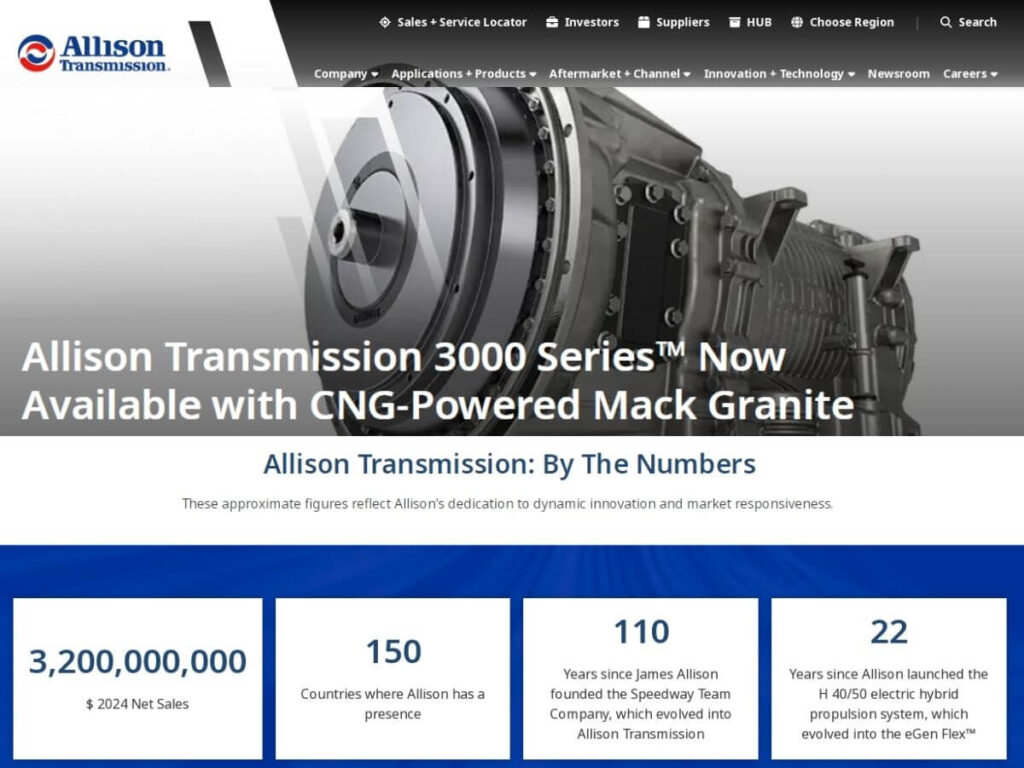
6. Bendix Commercial Vehicle Systems
You don’t realize how important a brake system is—until you’re flying downhill in a loaded truck. I heard that from a fleet driver hauling timber in West Virginia. He told me Bendix saved his life more than once.
Bendix was founded in 1924 and is headquartered in Avon, Ohio. Today, they operate under Knorr-Bremse Group, a global leader in braking systems. Bendix supplies key safety and control components for commercial vehicles across North America.
Product Range
- Air Disc and Drum Brakes: Precision braking for heavy-duty use
- Air Management Systems: Controls airflow to brakes and other pneumatic tools
- Advanced Safety Systems: Collision mitigation, lane departure, stability control
- Compressors & Valves: Helps manage air pressure for brake reliability
- Aftermarket Support: OEM-grade parts and diagnostics tools
Manufacturing Capabilities
- Production Volume: High-volume manufacturing at U.S.-based plants
- Product Types: Focused on braking, air control, and driver assistance
- Customization Options: OEM and aftermarket-grade solutions
- In-House vs. Outsourced: Core parts are made in-house
- Technology Used: Smart assembly, safety testing, and automation tools
Research & Development (R&D)
Bendix runs a full-scale R&D center in Ohio. Their team develops next-gen safety tech, like automatic emergency braking and blind-spot monitoring. All systems go through environmental and road simulation tests. They also adapt quickly to changes in safety regulations and electric truck platforms.
Key Takeaways
Bendix gives you more than just brakes—they give you confidence behind the wheel. However, because their systems are packed with tech and diagnostics, it’s a better fit if you already have a tech-savvy team or access to support tools.
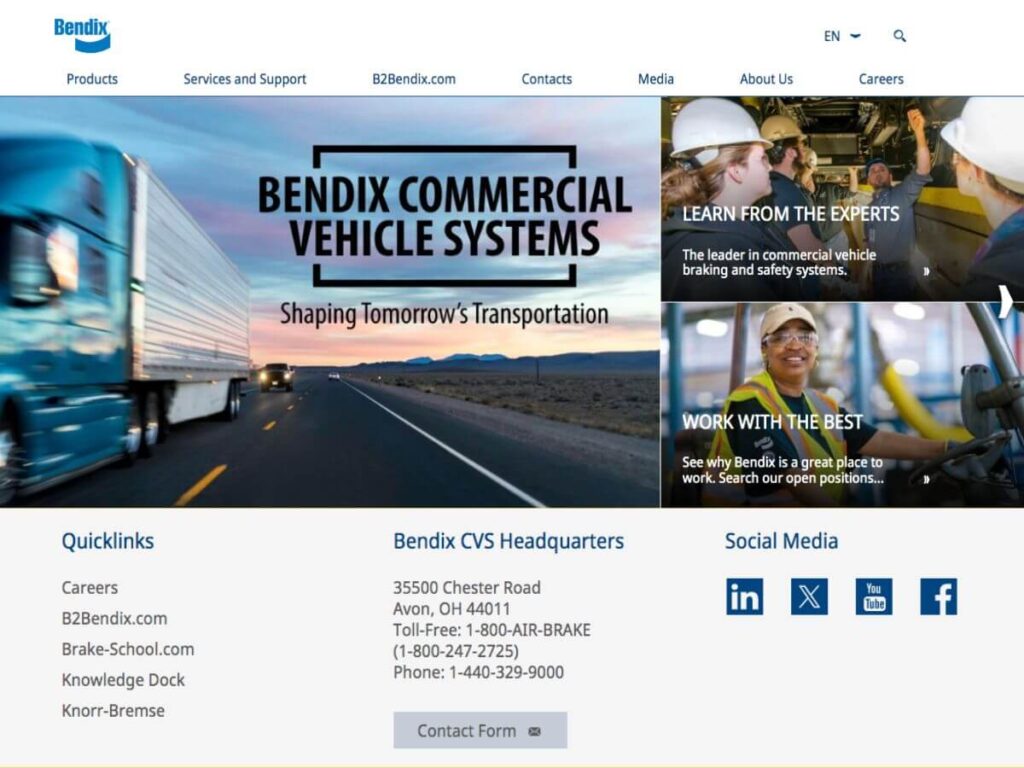
7. PACCAR Inc.
You’ve probably seen a Kenworth or Peterbilt on the road—clean lines, quiet power, and that unmistakable stance. I once rode in a Peterbilt 579 through the Midwest. The driver looked over and said, “This thing doesn’t just haul—it cruises.”
Founded in 1905, PACCAR is based in Bellevue, Washington. It’s the parent company of Kenworth, Peterbilt, and DAF. PACCAR is known globally for its heavy-duty trucks, high-performance diesel engines, and reliable parts support.
Product Range
- Trucks: Light, medium, and heavy-duty models under Kenworth, Peterbilt, and DAF
- Engines: In-house PACCAR diesel engines focused on fuel savings and long life
- Aftermarket Parts: OEM replacement parts through PACCAR Parts
- Financial Services: Leasing, loans, and fleet financing
Manufacturing Capabilities
- Production Volume: Tens of thousands of trucks each year
- Product Types: Custom-built Class 5–8 trucks, engines, and components
- Customization Options: OEM-grade build-to-order specs
- In-House vs. Outsourced: Most truck and engine work is done in-house
- Technology Used: Robotic welding, precision paint, and lean assembly lines
Research & Development (R&D)
PACCAR’s R&D centers work on clean energy, safety, and smart systems.
They develop electric trucks, aerodynamic upgrades, and fuel-saving tools. All new designs go through durability testing and road simulations before hitting production.
Key Takeaways
PACCAR builds trucks that are powerful, efficient, and built to last. However, because of their premium positioning, PACCAR trucks may come at a higher upfront cost than other options in the market.
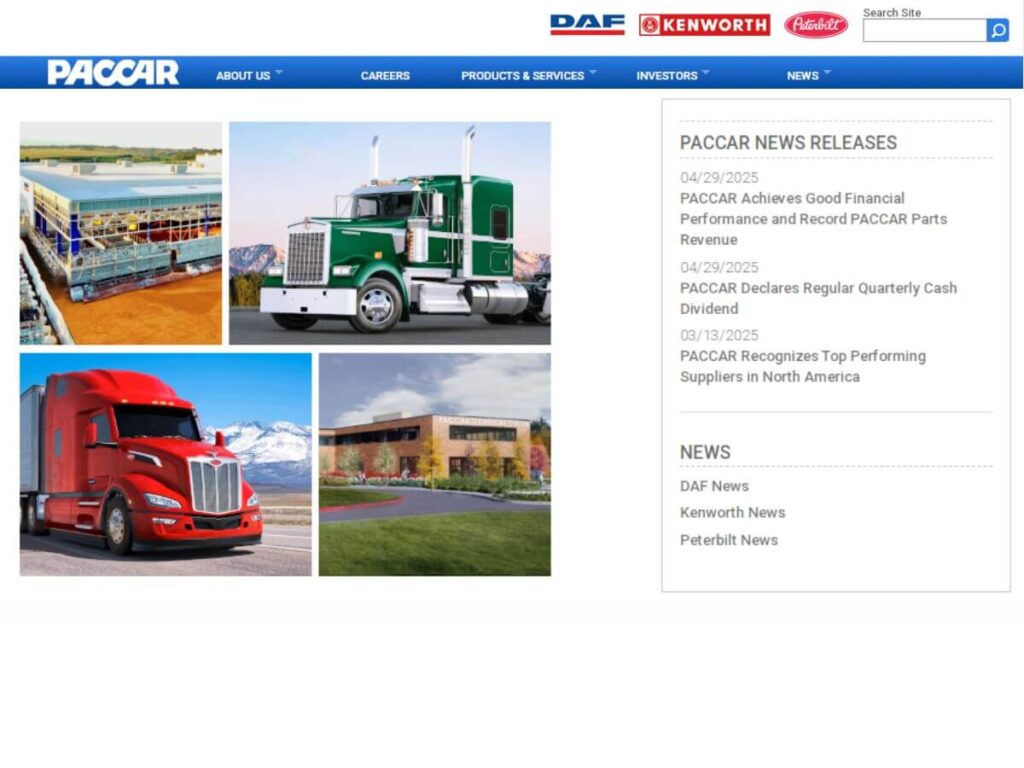
8. ZF WABCO
“You see that trailer?” a fleet manager once told me, pointing across the yard. “It used to sway like crazy until we put WABCO on it.” I nodded, watching the unit ease into the loading bay—smooth, stable, zero bounce. I remember thinking, That’s the kind of difference you don’t always see, but drivers definitely feel.
WABCO was founded in 1869, originally known for braking innovation. In 2020, they were acquired by ZF Group and now operate as part of ZF’s Commercial Vehicle Control Systems Division. Their parts help trucks stop safer, steer smarter, and stay balanced on the road.
Product Range
- Air Brake Systems: Built for consistent stopping power under load
- ABS and EBS: Anti-lock and electronic brake control systems
- Suspension Management: Keeps cargo stable and ride height controlled
- Vehicle Dynamics: Roll stability, yaw control, skid prevention
- Telematics and Fleet Tech: GPS, diagnostics, and performance tracking
Manufacturing Capabilities
- Production Volume: Millions of units per year
- Product Types: Brake, safety, air control, and electronic systems
- Customization Options: OEM support, integration kits, retrofit systems
- In-House vs. Outsourced: Most systems are made in-house
- Technology Used: Automated testing, sensor calibration, and smart assembly
Research & Development (R&D)
WABCO’s R&D focuses on road-tested safety innovation.
Their engineers build adaptive cruise, lane warning, and brake assist systems. All new tech is tested on both simulation tracks and live fleets. They also lead development in connected trucks and semi-autonomous control features.
Key Takeaways
WABCO brings your fleet more control, less wear, and smarter braking under pressure. However, if you don’t have trained technicians or telematics tools in place, it might take more effort to unlock the full value of their systems.
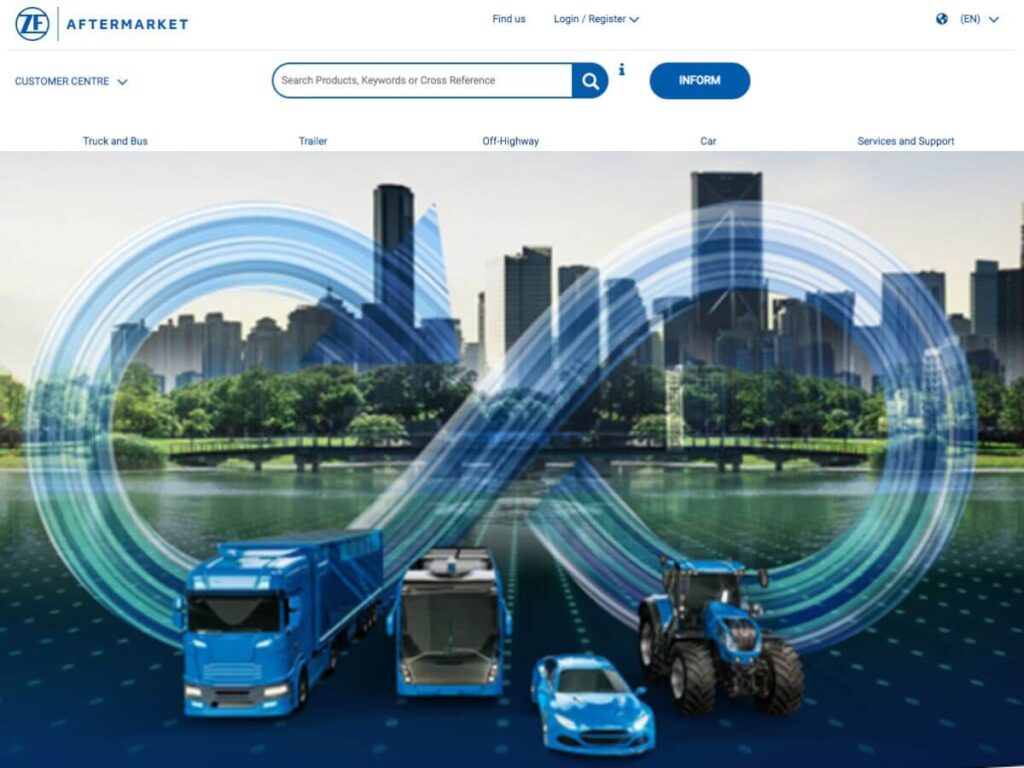
9. Volvo Trucks
When you see a Volvo truck on the road, it’s hard not to notice how smooth and steady it moves—even under load. You get the sense it was built with both the driver and the job in mind.
Founded in 1928 and based in Gothenburg, Sweden, Volvo Trucks is known around the world for safety, durability, and innovation. They operate in over 130 countries, offering commercial trucks that combine comfort, smart design, and fuel efficiency. Their trucks are trusted in everything from long-haul freight to demanding construction sites.
Product Range
- Electric Trucks: Zero-emission vehicles for city and regional routes
- Gas Trucks: Lower carbon output for long-distance hauling
- Heavy-Duty Series: Models like FH Aero and FMX for power and stability
- Driver-Focused Cabins: Ergonomic interiors with advanced driver-assist tech
Manufacturing Capabilities
- Production Volume: Thousands of units produced annually
- Product Types: Medium-duty and heavy-duty trucks
- Customization Options: OEM builds to match fleet specs
- In-House Control: Core parts and assembly done internally
- Technology Used: Over 200 robots in their U.S. plant alone
Research & Development (R&D)
Volvo’s R&D teams focus on three things: cleaner power, driver safety, and long-term performance.
They test electric drivetrains, autonomous features, and alternative fuels like LNG and HVO. New designs are validated with lab and road testing before launch.
Key Takeaways
Volvo Trucks delivers comfort, clean tech, and reliability in one well-built machine. However, because many features are premium-focused, base versions may require upgrades to meet specific jobsite or fleet expectations.
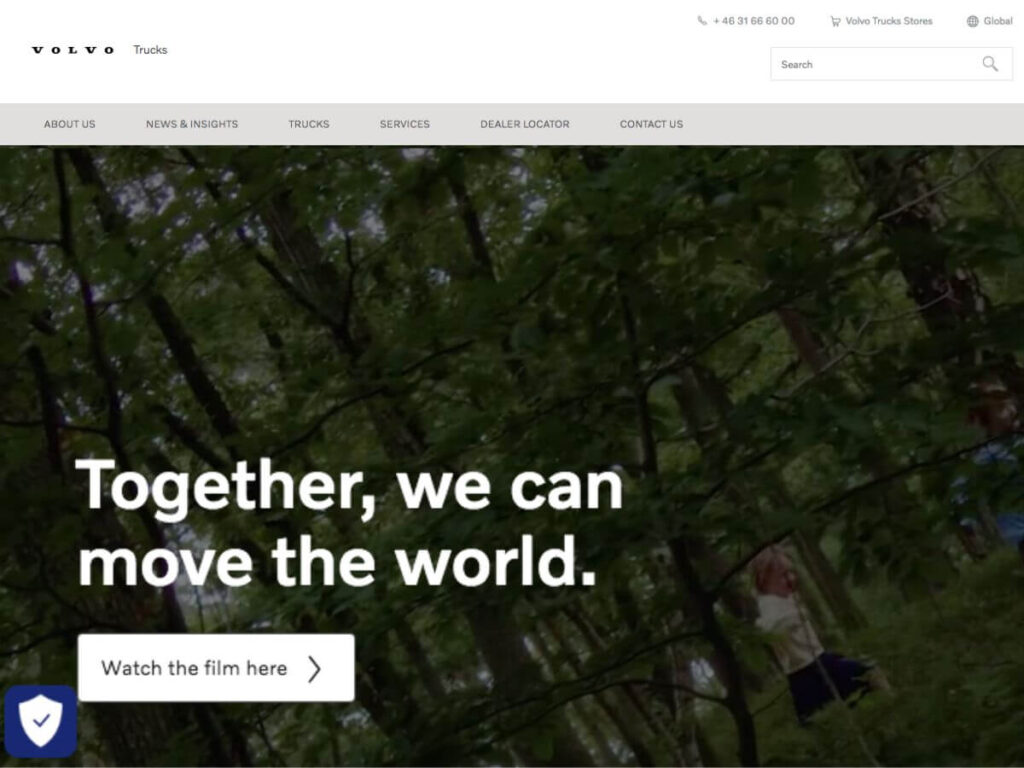
Conclusion
You’ve seen what top truck parts and trailer manufacturers can offer. We’ve compared capabilities, products, and strengths—side by side.
The goal? To help you find the right supplier for your fleet, your business, and your future. I’ve worked with buyers who felt stuck. But once they looked beyond local options, they found real solutions.
You can do the same.
If your trailer is the weak point, it’s time to make a change.
Contact us today to explore how we can help your business.

